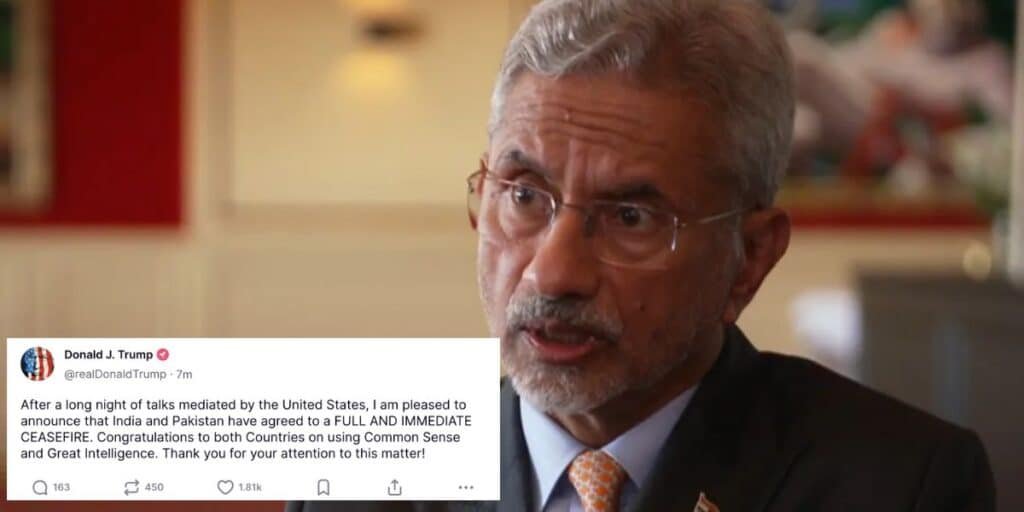Webdesk: India’s External Affairs Minister S. Jaishankar has claimed that the ceasefire during the June 2025 conflict between India and Pakistan took place through direct communication between the Directors General of Military Operations (DGMOs) of both countries, without any involvement from the United States.
Speaking in the Lok Sabha, Jaishankar rejected the claims made by US President Donald Trump, who had repeatedly said that he helped mediate peace between the two nuclear-armed neighbours. Trump had claimed more than two dozen times that he personally helped arrange the ceasefire between India and Pakistan.
Jaishankar told the Indian parliament that there was no phone call or communication between Prime Minister Narendra Modi and President Trump during the period of the conflict. “From April 22 to June 17, there was no telephonic contact between Prime Minister Modi and President Trump,” he said. He added that the only time President Trump reached out was on April 22, when he called to express regret over the Pahalgam incident.
The Indian Foreign Minister also said that during discussions with the US, at no point was there any link between trade talks and “Operation Sindoor,” the military operation carried out during the conflict. He claimed that US Secretary of State Marco Rubio only conveyed that Pakistan was willing to talk, after which the Pakistani DGMO directly contacted the Indian DGMO to request a ceasefire.
This statement directly contradicts Trump’s repeated remarks, in which he claimed to have played a key role in stopping the war. Jaishankar’s comments were India’s formal response to those claims and reflect New Delhi’s consistent position of not accepting third-party mediation in India-Pakistan matters.
During the same Lok Sabha session, opposition members raised sharp questions about Operation Sindoor. MP Parineeti Shinde criticised the government, saying that the operation appeared to be more of a media show than a real success. “No one is saying what was achieved, how many terrorists were caught, how many aircraft were lost. Who is responsible for the failures? The government must answer,” she said.
Another MP from Kerala stated that India had lost several fighter jets during the operation, including three Rafales, one Sukhoi-30, and one MiG-29. He said all of them were shot down within Indian territory.
Facing pressure from the opposition and growing criticism over the handling of the conflict, the Modi government briefly suspended the parliamentary session. Amid this political tension, reports emerged that Indian forces had killed three Kashmiri youth in what was being described by critics as a staged encounter. Some consider that it was the action of the government trying to recover losses in political fields as the result of the war with Pakistan.
The international community has also been putting pressure on India regarding their activities. Although numerous nations criticized the Pahalgam attack, they did not agree with the Indian assertion that Pakistan was involved in the attack. Former Indian Home Minister also previously admitted that there was no concrete evidence linking Pakistan to the attack.
Jaishankar’s remarks in parliament marked the first detailed official explanation from the Indian government about how the conflict ended. His statement clearly distances New Delhi from Washington’s narrative and underlines India’s refusal to allow outside involvement in its disputes with Pakistan.
Read more: Asia Cup 2025: BCCI rules out boycott, India to face Pakistan as scheduled






